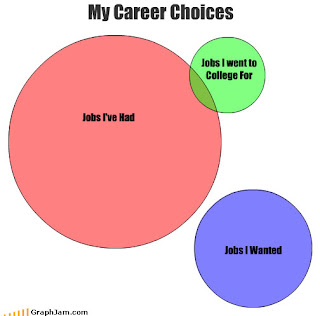I have been mulling over the nature of work. Or maybe work in the corporate world. It's hard for me to know for sure as I've worked in the corporate world now for 13 years. In those 13 years much has changed, and most of it for the better. But on the flip side, it does feel like things are getting tighter and tighter and smaller and smaller.
While I have, supposedly, climbed the ladder to some degree, the freedom and scope in my work have in many ways contracted. And I don't think it's just my company, or just the corporate/financial world - I think it's a general trend.
I don't want to romanticise non-corporate work either. I did my share in other jobs, and while I enjoyed them all for awhile, my main memory from those days is of the sheer grind, low pay and feeling of being left behind while others surged ahead.
So, clearly, there's no pleasing me. I don't know whether this is because I have never found work that truly suits me, or because this is just the way all work is. But I think it's a combination of both.
A story in The Age today left me gobsmacked. It sure was a different world back in 1954.
The British National Archives have released papers relating to the defection of Vladimir and Evdokia Petrov, which included the infamous episode of Evdokia Petrova being dragged aboard a plane from Sydney by KGB agents, and then defecting from Darwin when the aircraft refuelled. The refuelling and defection were facilitated by the pilot and stewards of BOAC, it would seem.
So this is an extraordinary tale, and it would have been extraordinary in 1954 as well. And the cold war (from distant memory of living in its final stages a couple of decades ago) made things very different to how they are today. This was a world in which a British flight crew was very much working for the British government and for the fight against the Soviet threat - not just on flying a plane from Sydney to Moscow.
In that world it was not odd for flight staff to assist a woman on the plane to defect.
But what struck me was the way the staff worked together, if you piece together the fragments of information:
The pilot, Captain John Davys, instructed the crew to "help" Mrs Petrova but doesn't appear to have given detailed instructions, warnings, caveats, threats or even guidelines in how to get this done.
The stewardess Joyce Bull and steward Stephen Muir "struck up a conversation" and "asked if she wanted to say anything".
Steward Muir conducted his conversation with Mrs Petrova including offers of help, encouragement and reassurance, seemingly off his own bat and without reference to any other party. This might not be the case of course - he could have been relaying each development to a superior with a "Leave it with me" or an "I'll get right back to you" to Mrs Petrova at every step - but it doesn't read that way.
Everyone did what they thought they should do, and everyone knew what to do.
Captain Davys opined in the secret report: ''I considered that Steward R. D. Muir is to be commended as it was largely due to his tact in handling the situation that induced Mrs Petrov to make her stand.''



So true. So true.
ReplyDeleteIt seems that we are raising people without common sense these days and that leaks into their adulthood and workplace. We are not giving people credit to think for themselves and on their own. From little on we baby proof and make safe everything in our childrens' world. Bike helmets and knee pads must be worn at all times (in my family too). When I was little we LEARNED to be very careful because we knew from experience that accidents could be painful. It seems there are just so many rules to everything these days. I just wonder if it is kind of the same thing in the workplace. I don't know. I've been out of it for a while. ;)
I love your charts and graphs too. :) HAHA!
Ah true, so true. Work does suck - and things have changed. It's a big reason I like my "portfolio career" - my main job (when I have one) and the other stuff I do - which I love. It is a pity some of the freedoms we had years ago are no longer there. I'm thinking cricket down the aisles of a back office when you're pissed on cider at 10 pm - wouldn't happen these days.
ReplyDeleteSo true Kat, you are right. Good point, this is all part of a wider trend. I wonder what the world will look like when our kids are running it? Maybe they will find a better way. They already seem smarter than we were; maybe their brains have been protected by all those helmets! ;-)
ReplyDeletePandora, yes - the portfolio career has its advantages. Agree there's no longer any chance for drunkenness and ball games in the office - but on the upside, we are far less likely these days to still be there at 10pm. Maybe there's a clue to all this as well...
Very thought provoking, Jackie K. Perhaps society's increased willingness to take legal action is also contributing to the constrictions of free thought and action?
ReplyDeleteI'm with Pandora on the portfolio career thing. All three jobs are important in their own way but if one of them had to go, then so be it.
Good points Kath,
ReplyDeleteyes the legal thing must be a factor. I know half - more than half - of what we do at work is all about "limiting liability". Even people's conversations and emails (especially emails) are framed in such a way.
Portfolio career - yes, another benefit to that I hadn't thought of.